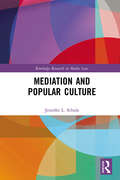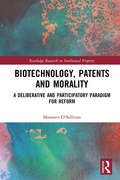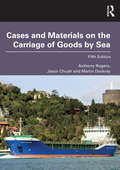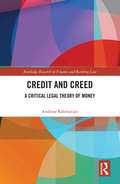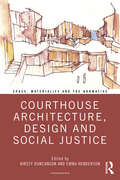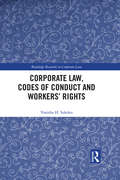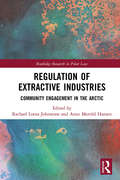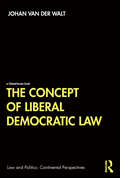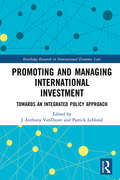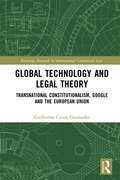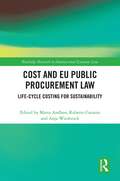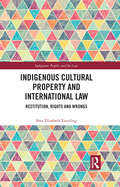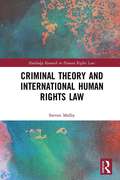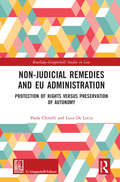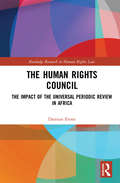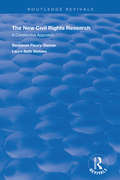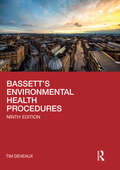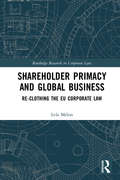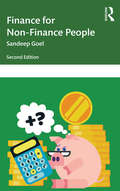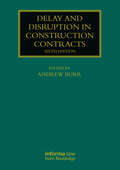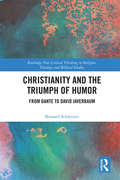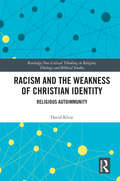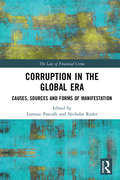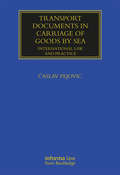- Table View
- List View
Mediation & Popular Culture (Routledge Research in Media Law)
by Jennifer L. SchulzThis book examines mediation topics such as impartiality, self-determination and fair outcomes through popular culture lenses. Popular television shows and award-winning films are used as illustrative examples to illuminate under-represented mediation topics such as feelings and expert intuition, conflicts of interest and repeat business, and deception and caucusing. The author also employs research from Australia, Belgium, Canada, China, Denmark, France, Germany, Greece, India, Israel, Japan, the Netherlands, New Zealand, Singapore, South Africa, Spain, the United Kingdom and the United States of America to demonstrate that real and reel mediation may have more in common than we think. How mediation is imagined in popular culture, compared to how professors teach it and how mediators practise it, provides important affective, ethical, legal, personal and pedagogical insights relevant for mediators, lawyers, professors and students, and may even help develop mediator identity.
Biotechnology, Patents and Morality: A Deliberative and Participatory Paradigm for Reform (Routledge Research in Intellectual Property)
by Maureen O'SullivanThis book critiques the decision-making process in Article 53(a) of the European Patent Convention. To date, such decisions have been taken at high levels of expertise without much public involvement. The book eschews traditional solutions, such as those found within legislative, judicial and patent office realms and instead develops a radical blueprint for how these decisions can be put to the public. By examining wide-scale models of participatory democracy and deliberation, this book fills a significant gap in the literature. It will be invaluable for patent lawyers, academics, practitioners and intellectual property and patent officials.
Cases and Materials on the Carriage of Goods by Sea
by Jason Chuah Anthony Rogers Martin DockrayCases and Materials on the Carriage of Goods by Sea, fifth edition, offers tailored coverage of the most commonly taught topics on Carriage of Goods by Sea courses. Combining a collection of legislative materials, commentaries, scholarly articles, standard forms and up-to-date English case law, it covers the major areas of chartering and bills of lading as well as matters such as exclusion and limitation of liability. Significant innovations for this edition include: coverage of blockchain technology and smart contracts in shipping coverage of autonomous shipping recent developments on the construction of commercial shipping contracts recent developments on the transfer of rights and liabilities in the contract of carriage tables and diagrams for ease of reading discussion of some of the most important decisions by the senior courts of England and Wales, with the most up to date case law included references to academic and professional literature for further reading and research industry standard form clauses reference to important foreign cases emphasis on how it is that shipping law operates and is applied in commercial practice A clear, student-friendly text design with a strong emphasis on research and problem solving. This up-to-date collection of materials relating to the carriage of goods by sea will be of value to students of law, researchers and legal practitioners.
Credit and Creed: A Critical Legal Theory of Money (Routledge Research in Finance and Banking Law)
by Andreas RahmatianMoney is a legal institution with principal economic and sociological consequences. Money is a debt, because that is how it is conceptualised and comes into existence: as circulating credit – if viewed from the creditor’s perspective – or, from the debtor’s viewpoint, as debt. This book presents a legal theory of money, based on the concept of dematerialised property. It describes the money creation or money supply process for cash and for bank money, and looks at modern forms of money, such as cryptocurrencies. It also shows why mainstream economics presupposes, but avoids an analysis of, money by effectively eliminating money from the microeconomic market model and declaring it as merely a neutral medium of exchange and unit of account. The book explains that money rather brings about and influences substantially the exchange or transaction it is supposed to facilitate only as a neutral medium. As the most liquid of all assets, money enables financialisation, monetisation and commodification in the economy. The central role of the banks in the money creation process and in the economy, and their strengthened position after the bank rescue measures in the wake of the financial crisis 2008-9 are also discussed. Providing a rigorous analysis of the most salient legal issues regarding money, this book will appeal to legal theorists, economists and anyone working in commercial or banking law.
Courthouse Architecture, Design and Social Justice
by Emma Henderson Kirsty DuncansonThis collection interrogates relationships between court architecture and social justice, from consultation and design to the impact of material (and immaterial) forms on court users, through the lenses of architecture, law, socio-legal studies, criminology, anthropology, and a former high court judge. International multidisciplinary collaborations and single-author contributions traverse a range of methodological approaches to present new insights into the relationship between architecture, design, and justice. These include praxis, photography, reflections on process and decolonising practice, postcolonial, feminist, and poststructural analysis, and theory from critical legal scholarship, political science, criminology, literature, sociology, and architecture. While the opening contributions reflect on establishing design principles and architectural methodologies for ethical consultation and collaboration with communities historically marginalised and exploited by law, the central chapters explore the textures and affects of built forms and the spaces between; examining the disjuncture between design intention and use; and investigating the impact of architecture and the design of space. The collection finishes with contemplations of the very real significance of material presence or absence in courtroom spaces and what this might mean for justice. Courthouse Architecture, Design and Social Justice provides tools for those engaged in creating, and reflecting on, ethical design and building use, and deepens the dialogue across disciplinary boundaries towards further collaborative work in the field. It also exists as a new resource for research and teaching, facilitating undergraduate critical thought about the ways in which design enhances and restricts access to justice.
Corporate Law, Codes of Conduct and Workers’ Rights (Routledge Research in Corporate Law)
by Vanisha H. SukdeoThis book critically explores how increased regulation and governance of corporations can be used to help improve the rights of workers amidst an era of union decline. The book posits that soft law techniques such as codes of conduct are more effective in protecting workers than "hard law" i.e. domestic regulation. It starts by analysing the transnational regulation of corporations and codes of conduct, and then puts forward a model code of conduct that can be used by corporations to help increase the protection of workers. Through this model's use of a monitoring scheme, shareholders, activists, and NGOs put pressure on the corporation to reform itself and enact a code which has obligations flowing both ways between the corporation and its employees. The book then looks at the expansions of fiduciary duties and changes to corporate governance, including Benefit Corporations and how they can be used to increase the rights of workers. It then discusses changes to standard union contracts before concluding with an assessment of the best way forward for workers’ rights. By providing a new contribution to the current dialogue on corporate social responsibility and codes of conduct, this book will be a valuable resource for academics working on labour, employment, and business law as well as corporate lawyers.
Regulation of Extractive Industries: Community Engagement in the Arctic (Routledge Research in Polar Law)
by Rachael Johnstone Anne HansenThis book intends to inform the key participants in extractive projects – namely, the communities, the host governments and the investors – about good practice for effective community engagement, based on analysis of international standards and expectations, lessons from selected case-studies and innovations in public participation. The extent of extractive industries varies widely around the Arctic as do governmental and social attitudes towards resource development. Whilst most Arctic communities are united in seeking investment to fund education, healthcare, housing, transport and other essential services, as well as wanting to benefit from improved employment and business opportunities, they have different views as to the role that extractive industries should play in this. Within each community, there are multiple perspectives and the goal of public participation is to draw out these perspectives and seek consensus. Part I of the book analyses the international standards that have emerged in recent years regarding public participation, in particular, in respect of indigenous peoples. Part II presents six case studies that aim to identify both good and bad practices and to reflect upon the distinct conditions, needs, expectations, strategies and results for each community examined. Part III explores the importance of meaningful participation from a corporate perspective and identifies some common themes that require consideration if Arctic voices are to shape extractive industries in Arctic communities. In drawing together international law and standards, case studies and examples of good practice, this anthology is a timely and invaluable resource for academics, legal advisors and those working in resource development and public policy.
The Concept of Liberal Democratic Law (Law and Politics)
by Johan van Der WaltThis book develops a historical concept of liberal democratic law through readings of the pivotal twentieth century legal theoretical positions articulated in the work of Herbert Hart, Ronald Dworkin, Duncan Kennedy, Rudolf Smend, Hans Kelsen and Carl Schmitt. It assesses the jurisprudential projects and positions of these theorists against the background of a long history of European metaphysics from which the modern concept of liberal democratic law emerged. Two key narratives are central to this history of European political and legal metaphysics. Both concern the historical development of the concept of nomos that emerged in early Greek legal and political thought. The first concerns the history of philosophical reflection on the epistemological and ontological status of legal concepts that runs from Plato to Hobbes (the realist-nominalist debate as it became known later). The second concerns the history of philosophical and political discourses on law, sovereignty and justice that starts with the nomos-physis debate in fifth century Athens and runs through medieval, modern and twentieth century conceptualisations of the relationship between law and power. Methodologically, the reading of the legal theoretical positions of Hart, Dworkin, Kennedy, Smend, Kelsen and Schmitt articulated in this book is presented as a distillation process that extracts the pure elements of liberal democratic law from the metaphysical narratives that not only cradled it, but also smothered and distorted its essential aspirations. Drawing together key insights from across the fields of jurisprudence and philosophy, this book offers an important and original re-articulation of the concept of democratic law.
Promoting and Managing International Investment: Towards an Integrated Policy Approach (Routledge Research in International Economic Law)
by J. Anthony VanDuzer Patrick LeblondThis book provides an overview of international investment policy and policy-making, drawing upon perspectives from law, economics, international business, and political science. International investment is a complex phenomenon with significant effects worldwide. Developing effective policies and strategies to attract investment in sufficient quantities and marshal it to contribute to sustainable development is a critical challenge for governments at all levels. This book’s interdisciplinary approach provides fresh insights into the mix of policy options available to governments seeking investment to support their country’s (or region’s) development. As well as identifying ways to effectively design, implement, and assess policies to attract foreign investment, it explores how to manage foreign investment’s effects. Various dimensions of international investment policy are discussed, including benefits and costs (economic, environmental, social, and political) of foreign investment, the significance of global value chains, state-owned enterprises and sovereign wealth funds, and the role of tax policy, investment promotion, and policy advocacy, location branding, investment treaties, and national security considerations. Through its contributions to a new interdisciplinary understanding of international investment policy-making, this book will benefit students and scholars working in areas such as international business, international economic law, international economics, development economics, international development, and international political economy as well as being a valuable resource for policy-makers.
Global Technology and Legal Theory: Transnational Constitutionalism, Google and the European Union (Routledge Research in International Commercial Law)
by Guilherme Cintra GuimarãesThe rise and spread of the Internet has accelerated the global flows of money, technology and information that are increasingly perceived as a challenge to the traditional regulatory powers of nation states and the effectiveness of their constitutions. The acceleration of these flows poses new legal and political problems to their regulation and control, as shown by recent conflicts between Google and the European Union (EU). <P><P> This book investigates the transnational constitutional dimension of recent conflicts between Google and the EU in the areas of competition, taxation and human rights. More than a simple case study, it explores how the new conflicts originating from the worldwide expansion of the Internet economy are being dealt with by the institutional mechanisms available at the European level. The analysis of these conflicts exposes the tensions and contradictions between, on the one hand, legal and political systems that are limited by territory, and, on the other hand, the inherently global functioning of the Internet. The EU’s promising initiatives to extend the protection of privacy in cyberspace set the stage for a broader dialogue on constitutional problems related to the enforcement of fundamental rights and the legitimate exercise of power that are common to different legal orders of world society. Nevertheless, the different ways of dealing with the competition and fiscal aspects of the conflicts with Google also indicate the same limits that are generally attributed to the very project of European integration, showing that the constitutionalization of the economy tends to outpace the constitutionalization of politics. <P><P> Providing a detailed account of the unfolding of these conflicts, and their wider consequences to the future of the Internet, this book will appeal to scholars working in EU law, international law and constitutional law, as well as those in the fields of political science and sociology.
Cost and EU Public Procurement Law: Life-Cycle Costing for Sustainability (Routledge Research in International Economic Law)
by Anja Wiesbrock Marta Andhov Roberto CarantaPublic institutions, companies and governments in the EU and around the world are increasingly engaging in sustainable public procurement – a broad concept that must consider the three pillars of economic equality, social welfare and public health and environmental responsibility when designing public tenders and finalizing government contracts. This book contributes to the development of life-cycle criteria tools and methodologies for public procurement in the EU. It collects both sector-crossing contributions analysing the most relevant theoretical and legal aspects, including both EU law and contract theory, and sector-specific contributions relating to some of the most important sustainable goods and services markets. The book starts with a chapter that discusses the different approaches to including sustainability considerations in buying decisions by both private and public purchasers, and then goes on to examine the EU law on LCC and how it is implemented in different Member States. These chapters address the challenges in balancing economic and sustainability objectives under EU internal market law. One chapter develops the analysis with specific reference to public-private partnership. Another chapter elaborates how multi-stakeholders’ cooperation is necessary to develop LCC, based on a case study of a lighting services procurement. Three sector-specific studies relating to social housing, textile and clothing and IT close the book. With contributors from a range of backgrounds including law, business, management, engineering and policy development, this interdisciplinary book provides the first comprehensive study on LCC within the framework of EU public procurement law.
Indigenous Cultural Property and International Law: Restitution, Rights and Wrongs (Indigenous Peoples and the Law)
by Shea Elizabeth EsterlingExamining the restitution of cultural property to Indigenous Peoples in human rights law, this book offers a detailed analysis of the opportunities and constraints of international law as a tool of resistance and social transformation for marginalized groups. In accordance with an increasing insistence on respect for diverse cultures, and through their own international mobilization, Indigenous Peoples have participated in the construction of a distinct human rights framework. Significant academic inquiry has focused on the substantive gains made by Indigenous Peoples in this context; along with its impact on a body of law that had previously denied Indigenous Peoples a basis for claims to their own cultural materials and practices. Accordingly, this book acknowledges that Indigenous Peoples, as non-state actors, have generated greater substantive and procedural legitimacy in human rights law making. Offering normative insights into the participation of non-state actors in international law making, it also, however, demonstrates that, despite their significant role in constructing the legal framework of human rights in the 21st century, the participation of Indigenous Peoples continues to be structurally limited. With its interdisciplinary approach to the field, this book will appeal to scholars and students in the fields of law, politics, anthropology and indigenous studies.
Criminal Theory and International Human Rights Law (Routledge Research in Human Rights Law)
by Steven MalbyThe development of an international human rights jurisprudence on criminalization is in its relative infancy. Nonetheless, systematic examination of international decisions on acts engaging the criminal law reveals an emerging human rights approach to the acceptability, or not, of criminalization. This book provides an in-depth characterization of the reasoning and principles that underpin those decisions. The work builds upon and adds value to existing literature by bringing together two fields of study – international human rights law and criminal theory – that usually receive separate treatment. It provides an in-depth analysis of human rights criminalization jurisprudence and presents a systematic identification of underlying reasoning and concepts that influence international human rights decisions on criminalization. The work thus advances both fields independently, as well as providing an example of inter-(sub)disciplinary analysis. The book will be a valuable resource for academics and students working in the areas of International Human Rights Law, Criminal Law, and Moral Philosophy.
Non-Judicial Remedies and EU Administration: Protection of Rights versus Preservation of Autonomy (Routledge-Giappichelli Studies in Law)
by Paola Chirulli Luca De LuciaThe increasing number of executive tasks assigned to EU institutions and agencies has resulted in a greater demand for justice that can no longer be satisfied by the courts alone. This has led to the development of a wide range of administrative remedies that have become a central part of the EU administrative justice system. This book examines the important theoretical and practical issues raised by this phenomenon. The work focuses on five administrative remedies: internal review; administrative appeals to the Commission against decisions of executive and decentralised agencies; independent administrative review of decisions of decentralised agencies; complaints to the EU Ombudsman; and complaints to the EU Data Protection Supervisor. The research rests on the idea that there is a complex, and at times ambivalent, relationship between administrative remedies and the varying degrees of autonomy of EU institutions and bodies, offices and agencies. The work draws on legislation, internal rules of executive bodies, administrative practices and specific case law, data and statistics. This empirical approach helps to unveil the true dynamics present within these procedures and demonstrates that whilst administrative remedies may improve the relationship between individuals and the EU administration, their interplay with administrative autonomy might lead to a risk of fragmentation and incoherence in the EU administrative justice system.
The Human Rights Council: The Impact of the Universal Periodic Review in Africa (Routledge Research in Human Rights Law)
by Damian EtoneThis book examines the engagement of African states with the United Nations Human Rights Council’s Universal Periodic Review (UPR) mechanism. This human rights mechanism is known for its pacific and non-confrontational approach to monitoring state human rights implementation. Coming at the end of the first three cycles of the UPR, the work offers a detailed analysis of the effectiveness of African states’ engagement and its potential impact. It develops a framework which comprehensively evaluates aspects of states’ UPR engagement, such as the pre-review national consultation process and implementation of UPR recommendations which, until recently, have received little attention. The book considers the potential for acculturation in engagement with the UPR and unpacks the impact of politics, regionalism, cultural relativism, rights ritualism and civil society. The work provides a useful guide for policymakers and international human rights law practitioners, as well as a valuable resource for international legal and international relations academics and researchers.
The New Civil Rights Research: A Constitutive Approach (Routledge Revivals)
by Laura Beth NielsenFirst published in 2006, this book brings together some of the most innovative and important research on civil rights law and legality, this book draws on narratives of individuals from a variety of contexts to provide a rich and contextualized understanding of what happens when law interacts with other competing systems or forms of social organization. By privileging the real world experiences of those most influenced by rights, the collection moves beyond the traditional polarizing debates and presents a constitutive approach to rights that is not reducible to a simple 'for or against' rights formula. While this complex consciousness approach often contributes to the reproduction of dominant-subordinate social relations, it also allows for spaces of resisting existing hierarchical structures embedded in various law-related sites.
Indigenous Land Rights in Israel: A Comparative Study of the Bedouin (Routledge Studies in Middle Eastern Politics)
by Morad ElsanaIntroducing the Negev–Bedouin land issue from the international indigenous land rights perspective, this comparative study suggests options for the recognition of their land. The book demonstrates that the Bedouin land dispossession, like many indigenous peoples’, progressed through several phases that included eviction and displacement, legislation, and judicial decisions that support acts of dispossession and deny the Bedouin’s traditional land rights. Examining the Mawat legal doctrine on which the State and the Court rely on to deny Bedouin land rights, this volume introduces the relevant international law protecting indigenous land rights and shows how the limitations of this law prevent any meaningful protection of Bedouin land rights. In the second part of the work, the Aborigines’ land in Australia is introduced as an example of indigenous peoples' successful struggle for their traditional land rights. The final chapter analyzes the basic elements of judicial recognition of the land and shows that the basic elements needed for Bedouin land recognition exist in the Israeli legal system. Proposing practical recommendations for the recognition of Bedouin land, this volume is a key resource to scholars and students interested in land rights, international law, comparative studies, and the Middle East.
Bassett's Environmental Health Procedures
by Tim Deveaux W.H. BassettEnvironmental health law is a wide-ranging, detailed and complex body of law within the UK. Bassett’s Environmental Health Procedures is an established and essential reference source which provides an accessible entry into enforcement and administrative procedures for environmental health. The main legal procedures used in the environmental health field are presented as flow charts supported by explanatory text. This ninth edition refines the structure introduced in the eighth edition, with each chapter addressing a single topic. It has introduced the titles of the corresponding legislation in Scotland and Northern Ireland where there is such legislation. The book has been updated throughout to reflect new practices, legislation and statutory guidance. Specifically, the ninth edition contains new content on Antisocial Behaviour and significant updates to sections on: Enforcement and Administration Environmental Protection Food Safety Housing and Public Health Environmental Health Officers/Practitioners and students will find this book invaluable. It will also be an essential reference for all those whose responsibilities demand they keep abreast of current environmental health practices.
Shareholder Primacy and Global Business: Re-clothing the EU Corporate Law (Routledge Research in Corporate Law)
by Lela MélonIn the context of growing public interest in sustainability, Corporate Social Responsibility (CSR) has not brought about the expected improvement in terms of sustainable business. Self-regulation has been unable to provide appropriate answers for unsustainable business frameworks, despite empirical proof that sustainable behaviour is entirely in corporate enlightened self-interest. The lack of success of the soft law approach suggests that hard law regulation may be needed after all. This book discusses these options, alongside the issue of shareholder primacy and its externalities in corporate, social, and natural environment. To escape the "prisoner’s dilemma" European corporations and their global counterparts have found themselves in, help is needed in the form of EU hard law to advocate sustainability through mandatory rules. This book argues that the necessity of these laws is based on the first-mover’s advantage of such corporate law approach towards sustainable development. In the current EU law environment, where codification of corporate law is sought for, forming and defining a general EU policy could not only help corporations embrace this self-enlightened behaviour but could also build the necessary "EU corporate citizenship" atmosphere. Considering the developments in the field of CSR as attempts to mitigate negative externalities resulting from inappropriate shareholder primacy use, the book is centred around a discussion of the shareholder primacy paradigm, its legal position and its (un)suitability for modern global business. Going beyond solely legal analysis, juxtaposing legal principles and argumentation with economic theoretic approaches and, more importantly, real-life examples, this book is accessible to both professionals and academics working within the fields of business, economics, corporate governance and corporate law.
Finance for Non-Finance People
by Sandeep GoelFinance is key to every business organisation as well as outside. This book makes sense of the finance world from a non-finance perspective. It introduces, explains and demystifies essential ideas of business finance to those who do not have financial background or training. Lucid, accessible yet comprehensive, the book delineates the financial workings of businesses and offers an overview of corporate finance in the global context. The volume: Contains effective tools for financial communication, monitoring, analysis and resource allocation Provides important learning aids such as figures, tables, illustrations and case studies Highlights fundamental concepts and applications of finance Surveys global corporate practices, recent trends and current data This updated second edition contains new sections on Tax Planning, including Income Tax and Goods and Services Tax in India. A guide to building financial acumen, this book will be a useful resource for executive and management development programmes (EDPs & MDPs) oriented towards business managers, including MBA programmes. It will benefit business executives, corporate heads, entrepreneurs, government officials, teachers, researchers and students of management and business besides those who deal with finance or financial matters in their daily lives.
Delay and Disruption in Construction Contracts (Construction Practice Series)
by Andrew Burr Annabella Matute-CastroNow in its sixth edition, Delay and Disruption in Construction Contracts retains its position as foremost guide to the complex issues arising in the course of construction, with robustly-updated content throughout and the addition of several new chapters with focus on such topics as standard form provisions for recovery of loss or expense, and Chinese and Peruvian construction law.Expertly covering the manner in which delay and disruption should be considered at each stage of a construction project, from inception to completion and beyond, this book includes: Insight from an international team of specialist advisory editors Comparative analysis of the law in this field in Australia, Canada, England and Wales, Hong Kong, Ireland, New Zealand, the United States and in civil law jurisdictions Commentary upon, and comparison of, standard forms from Australia, Ireland, New Zealand, the United Kingdom, USA and elsewhere, including two major new forms Chapters on adjudication, dispute boards and the civil law dynamic Extensive coverage of Building Information Modelling New chapters on Chinese, Nordic, Peruvian, Singaporean and Malaysian construction law New in-depth discussion of the JCT 2016 suite Updated case law, linked directly to the principles explained in the text. This book is an essential reference for any lawyer, dispute resolver, project manager, architect, engineer, contractor, or academic involved in the construction industry.
Christianity and the Triumph of Humor: From Dante to David Javerbaum (Routledge New Critical Thinking in Religion, Theology and Biblical Studies)
by Bernard SchweizerThis book traces the development of religious comedy and leverages that history to justify today’s uses of religious humor in all of its manifestations, including irreverent jokes. It argues that regulating humor is futile and counterproductive, illustrating this point with a host of comedic examples. Humor is a powerful rhetorical tool for those who advocate and for those who satirize religious ideals. The book presents a compelling argument about the centrality of humor to the story of Western Christianity’s cultural and artistic development since the Middle Ages, taking a multi-disciplinary approach that combines literary criticism, religious studies, philosophy, theology, and social science. After laying out the conceptual framework in Part 1, Part 2 analyzes key works of religious comedy across the ages from Dante to the present, and it samples the breadth of contemporary religious humor from Brad Stine to Robin Williams, and from Monty Python to South Park. Using critical, historical, and conceptual lenses, the book exposes and overturns past attempts by church authorities, scholars, and commentators to limit and control laughter based on religious, ideological, or moral criteria. This is a unique look into the role of humor and comedy around religion. It will, therefore, be of great interest to scholars of Religious Studies, Humor Studies, and the Sociology of Religion.
Racism and the Weakness of Christian Identity: Religious Autoimmunity (Routledge New Critical Thinking in Religion, Theology and Biblical Studies)
by David KlineDespite the command from Christ to love your neighbour, Western Christianity has continued to be afflicted by the evil of racism and the acts of violence that accompany it. Through a systems theoretical and deconstructive account of religion and the political theology of St. Paul, this book traces how the racism and violence of modern Western Christianity is a symptom of its failure to secure its own myth of sovereignty within a complex world of plurality. Divided into three sections, the book begins with a philosophical and critical account of what it calls the immune system of Christian identity. Focusing on Pauline political theology as reflective of an inherent religious "autoimmunity" built into Christian community, a theory of theological-political violence is located within Western Christianity. The second section traces major theoretical aspects of the historical "apparatus" of Christian Identity. It demonstrates that it is ultimately around the figure of the black slave that racialized Christian identity becomes a system of anti-blackness and white supremacy. The book concludes by offering strategies for thinking resistance against such racialised Christian identity. It does this by constructing a "pragmatics of faith" by engaging Deleuze’s and Guattari’s use of the term pragmatics, Moten’s theory of black fugitivity, and Long’s account of African American religious production. This wide-ranging and interdisciplinary view of Christianity’s relationship to racism will be of keen interest to scholars of Religious Studies, Theological Studies, Cultural Studies, Critical Race Studies, American Studies, and Critical Theory.
Corruption in the Global Era: Causes, Sources and Forms of Manifestation (The Law of Financial Crime)
by Nicholas Ryder Lorenzo PasculliCorruption is a globalising phenomenon. Not only is it rapidly expanding globally but, more significantly, its causes, its means and forms of perpetration and its effects are more and more rooted in the many developments of globalisation. The Panama Papers, the FIFA scandals and the Petrobras case in Brazil are just a few examples of the rapid and alarming globalisation of corrupt practices in recent years. The lack of empirical evidence on corrupt schemes and a still imperfect dialogue between different disciplinary areas and between academic and practitioners hinder our knowledge of corruption as a global phenomenon and slow down the adoption of appropriate policy responses. Corruption in the Global Era seeks to establish an interdisciplinary dialogue between theory and practice and between different disciplines and to provide a better understanding of the multifaceted aspects of corruption as a global phenomenon. This book gathers top experts across various fields of both the academic and the professional world – including criminology, economics, finance, journalism, law, legal ethics and philosophy of law – to analyze the causes and the forms of manifestation of corruption in the global context and in various sectors (sports, health care, finance, the press etc.) from the most disparate perspectives. The theoretical frameworks elaborated by academics are here complemented by precious insider accounts on corruption in different areas, such as banking and finance and the press. The expanding links between corrupt practices and other global crimes, such as money laundering, fraud and human trafficking, are also explored. This book is an important resource to researchers, academics and students in the fields of law, criminology, sociology, economics and ethics, as well as professionals, particularly solicitors, barristers, businessmen and public servants.
Transport Documents in Carriage Of Goods by Sea: International Law and Practice (Maritime and Transport Law Library)
by Časlav PejovićBringing a fresh, comparative approach to transport documents used in the carriage of goods by sea, this book covers bills of lading, sea waybills, ship’s delivery orders, multimodal transport documents, and electronic transport documents. The book covers historic developments, current conventions, and thoughts for the future on these transport documents; and delves deeply into the legal issues concerning them. It represents a comprehensive compilation of case and statute law from around the world on this subject. In addition to English law, the book covers American, French, German, and Italian laws, as well as the laws of several East Asian jurisdictions (China, Japan, South Korea). Primarily, the book will be of use to maritime law scholars and students, and lawyers who deal with shipping. It may also be of interest to international traders, banks, and ship masters and officers.
